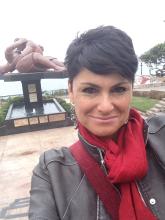Dear friends,
Welcome to another exciting year in CHID! As we reach the final stretch of fall quarter, I wanted to send a quick note to let you know of some important developments in our program and community.
Let me start by introducing Caroline Simpson, our newest faculty member who comes to us from the English department. If you know Caroline, you already know how much energy and enthusiasm she brings to CHID. We are so lucky to have her. She is an incredibly talented teacher, a literary scholar and a feminist scholar of race and difference. Caroline also brings wonderful skills and experience acquired through her work overseeing the curricular overhaul of English and also serving on the external committee that reviewed CHID in 2005. She joins CHID just in time as we are preparing for the up-coming ten-year program review!
What is a ten-year review? Well, briefly, this is an opportunity for us to think about what we have accomplished, what more we would like to do, and what support we need from the UW to make that happen. We have an outstanding group of scholars who will serve on the committee that will make recommendations to the UW administration. While these reviews are notoriously time-consuming and challenging, this process has already led to invigorating conversations among CHID faculty, staff, and students. These conversations—about CHID’s intellectual and pedagogical projects, our curricular offerings and goals, our international and experiential programs, and our vision for the future—have already contributed to our community-building and collective dreaming. Although many programs dread these reviews, I have been thrilled, impressed, but somehow not surprised that CHID has found a way to turn the process of asking tough questions into something that comes very close to feeling like fun intellectual work.
Of course, there will be challenges to change and growth. As we consider the possibility of becoming a line-bearing program and hiring additional faculty to join CHID, we need to think carefully about the impact of these changes on our community. How can we continue to support the many part-time lecturers who for so many years have provided innovative courses for our students? How do we maintain and expand support for the outstanding graduate students who help us build and sustain our intellectual community?
Much of what is possible will depend on generating additional resources in staffing, physical space, financial support, and more. But we are optimistic. Our award-winning students, staff and faculty have proven again and again that we are doing outstanding work. At a time when talk about the crisis in the humanities seems to be always rising, we find that CHID is a place that continues to attract students and faculty. Our majors and minors continue to increase and we have been forging connections across campus, as evidenced by our growing number of affiliate faculty. This year we also inaugurated the Collaborative Learning and Interdisciplinary Pedagogy (CLIP) Fellows Program, a teaching fellowship that supports graduate students and/or part-time lecturers in innovative, collaborative teaching and research.
At the intersections of science, art, the humanities and social sciences, CHID has become known as a place for collaboration, critical inquiry and social engagement. In just the last year, CHID worked with colleagues and artists from across the Americas, co-organized a series of lectures and workshops as part of the Postcolonial and Intersectional Animal Studies initiatives, and fostered collaborations around pedagogical innovation with local high school teachers. Additionally, thanks to Phillip Thurtle’s work with colleagues over the past few years, CHID has been part of establishing a network for scholars interested in studying Science and Technology Studies at the University of Washington. These efforts culminated this year with the introduction of a graduate certificate program in Science, Technology and Society Studies.
We have also faced some very difficult changes. After almost thirteen years of incredible dedication, Amy Peloff left CHID to pursue new personal and professional challenges. John Toews has announced that he will retire from the UW in spring 2016 after decades of inspiring teaching and writing. Those are real losses, but Amy and John, and countless others, have made CHID much more than the sum of its parts. Thanks to the contributions of many people, including you, CHID begins its next ten years of activities with a vibrant sense of purpose and possibility.
All the best,
María Elena García
Letter from the Director
Submitted by Terrence E Schenold
on
